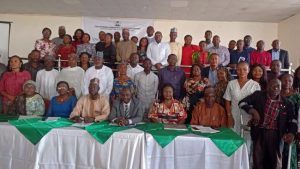To fulfill Nigeria’s global goal of reducing emissions by 20% unconditionally and 47% conditionally by 2030, stakeholders say the government must establish a solid legal framework at the subnational level to address the country’s short-lived environmental pollutants.

Building a strong legal regime, they contend, will compel people to obey the rules and ensure that strict disciplinary measures are taken against violators. They added that it would also make it easier to attract both domestic and foreign investment since investors will have confidence that their investments will be secure.
Speaking at a stakeholders’ workshop organised by the Ministry of Environment’s Department of Climate Change (DCC) on the implementation of the Federal Executive Council’s (FEC) approved national action plan to reduce short-lived climate pollutants (SLCPs) on May 15 and 16, 2023, in Keffi, Nasarawa State, the group advocated that enforcement should focus on the plan’s eight key sources of pollutants. They are oil and gas, transportation, residential cooking and lighting, waste, agriculture and livestock, hydrofluorocarbons (HFCs), industrial, and power sectors.
The SLCPs blueprint, which the industry actors regarded as a key milestone in reducing greenhouse gas (GHG) emissions, was adopted by the FEC in 2019 to accelerate action that will help Nigeria meet its international commitment to cut emissions.
They emphasised that mainstreaming all of the plan’s objectives and actions at the sub-national level is one of the most effective ways to promote its execution. They highlighted, for example, that prohibiting open burning in the waste management sector as well as the import of electrical equipment containing HFCs would considerably lessen the problem of black carbon.
These regulations, according to Agbo Chinonso, chief operating officer of Schrodinger Greentech Ltd., are already in place. He believes that the priority should be to enforce them immediately so that Nigeria can achieve its goal in accordance with the action plan.
Chinonso informed participants in a paper he presented at the event on best practices for lowering SLCPs in the agricultural, industrial, waste, and energy sectors that one of the approaches that can be used to combat this particular setback is to raise awareness at the grassroots level. The benefit, he explained, is to instill behavioral change because people’s views toward waste products have to change if the government is to accomplish its emission reduction targets.
He suggested that manufacturers be provided incentives such as tax credits and subsidies on the importation of specialised components in order to increase local adoption of these products.
According to Dr. Iniobong Abiola-Awe, director of the DCC, the goal of the conference was to bring stakeholders, particularly those at the subnational level, together and engage them in discussions about all aspects of the plan’s execution.
She noted that the gathering was also meant to improve collaboration, learn about stakeholders’ activities, and share opportunities and progress information.
The director, who was represented by Mrs. Asmau Jibril, overseeing head of the mitigation division, stressed that it was critical for interested parties to collaborate in order to reduce emissions in the primary sectors listed in the work plan and enable Nigeria to meet its promise to reduce emissions.
“You know, we’ve committed to the international community that Nigeria will cut 20% of its greenhouse gas emissions unconditionally by 2030 and 47% conditionally with global assistance,” she said.
As a result, the DCC chieftain urged the delegates, particularly those at the subnational level, to initiate projects that will tackle short-lived pollution in their respective states and assist Nigeria in meeting its international obligations under the United Nations Framework Convention on Climate Change (UNFCCC).
In his goodwill message, Nasarawa State Commissioner of Environment, Kwanta Yakubu, expressed his delight that the Federal Ministry of Environment chose his state to host the event. He remarked that this gesture would go a long way towards improving their commitment to the Federal Government’s environmental policies and activities.
According to him, Nasarawa State is endowed with arable land for plant cultivation and carbon regeneration, which is crucial in combating climate change as a result of challenges to forest resources generated by a forest-dependent population.
“Be assured that Nasarawa State will fully participate in this component of the revised NDCs in meeting our climate mitigation goals and targets in line with our state’s commitment,” he said.
By Etta Michael Bisong, Abuja
